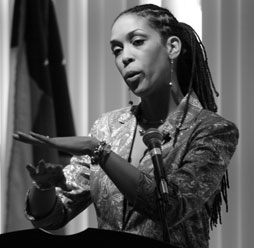By André Green/se news editor

Self-empowerment, respect and community service were among the themes during a Women’s History Month celebration on SE Campus recently.
Angelique Tégé, producer and reporter for WFAA’s Metro, spoke before students, faculty and staff March 21, focusing on the importance of thinking positively and never letting opportunities go unanswered.
As a high school student, Tégé said journalism was the furthest thing from her mind.
“ I went to an academic high school that specialized in math and science,” she said. “I had no intentions of being a journalist.”
Unfortunate events forced her to quit school and enter the workforce at an early age, a career path she shares with a world-renown news anchor.
“ I, like Peter Jennings, never finished high school,” she said. “I obtained my G.E.D. and started working.”
She began as a junior art director at a New York advertising agency but became one of the many victims of a national recession in the late ’80s.
Tégé listed herself with a temp agency and was subsequently placed at Court TV as an associate talent scout.
“ I booked the attorneys for the O.J. Simpson trial, William Kennedy and Dr. Kevorkian, to name a few,” she said.
It wasn’t until the outcome of the Simpson trial that Tégé began to discover an interest in journalism.
She said executives approached her with ideas for educating younger viewers on the justice system.
“ With the outcome of the verdict, people were worried the youth would get the wrong idea about the justice system,” she said.
Tégé hosted Court TV’s Justice Factory and What’s the Verdict, two educational programs designed to teach teens about the law and its effect on their lives.
“I was hired based on talent and intelligence,” she said.
She began traveling the country speaking to teens and soon discovered working in the community was what she ultimately wanted to do.
Tégé also credits trends of the time for her hire.
It was during the mid ’90s that the afro and short hair was en vogue and considered trendy.
Tégé, who is of West Indian heritage, began to grow her hair and lock it.
She said that is when she began to have problems at the network.
“ I had been asked to cut my hair because in New York it was deemed too radical,” she said.
Tégé refused to change her style because she wanted to be true to herself and her roots.
She soon arrived in Dallas and began working for WFAA.
Her number one goal was community involvement and information, areas in which she is still deeply involved.
“ The community motivates me to do what I do,” she said. “It’s me empowering myself.”
Tégé said it is especially important to interact with people in black neighborhoods and share their stories.
“ I am proud to come from Court TV and work on a program that empowers the black community,” she said.
Working within the black community, along with speaking engagements, gives her the opportunity to dispel rumors and notions people may have about entertainers and media personnel.
Tégé shared clips of her pre-Grammy interviews with rhythm and blues superstar Mary J. Blige and actress Ruby Dee, wife of the late Ossie Davis.
Blige talked about her difficulties and the problems she had in her life despite fame and fortune. She said her biggest obstacle was overcoming self-destructive habits and learning to love herself.
Tégé said Blige’s point emphasized reality versus fantasy for fans when they look at celebrities as well as members of the media.
“ We aren’t all millionaires, and we have many of the same problems everyone else has,” she said. “When you look at people, don’t look at what others have. Many people think that many of us in the media have it made, and that is not the case.”
During her interview, Tégé couldn’t help but wipe back tears when discussing Davis with Dee.
Afterward, an audience member inquired if that instance was regarded as getting too involved in a story.
“ Sometimes you can’t help but get involved in your stories,” she said. “It just happens.”
Tégé told the students she plans to continue her work in the community and she hopes she can make a difference and impact as many lives as possible while she is able.
“ When I die, I want 100 cars behind my casket,” she said. “If I don’t have those hundred cars, then what did I do while I was here?”
Metro airs Sundays at 11:15 p.m.
The event was sponsored by student activities.

























